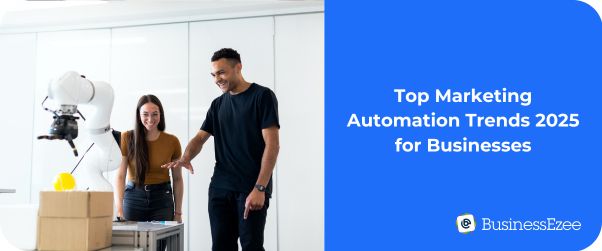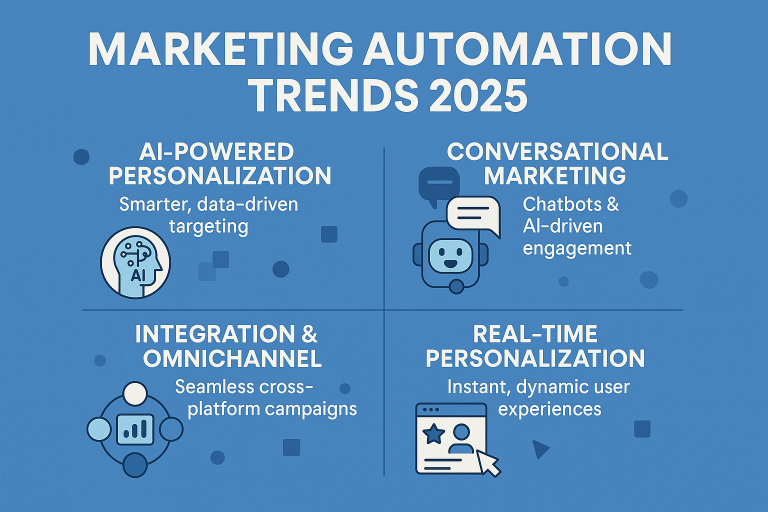Top Marketing Automation Trends in 2025: What Businesses Should Know
Marketing automation will revolutionize the communication strategies of the brands, smoothness of operations or processes and growth. Looking forward into the future to 2025, what is changing is the technology and consumer behaviours that are shifting automation. Business entities should stay updated on these changes so that they are in a position to compete and gain as much as possible out of their marketing.

The Evolution of Marketing Automation in 2025
The marketing automation sector has undergone an unprecedented rise and the global market is projected to grow to reach $25.1 billion by 2030. This is because it is an indication of how businesses recognize the potential of automation in boosting customer experience and cutting operational costs.
Why Marketing Automation Is So Important
In this high-velocity, digitalized world, customers would like to have personalized, time, and multi touch interactions. Marketing automation allows businesses to ensure no lead is lost in translation and that it is possible to deliver such experiences at scale, consistently maintaining brand messaging

AI-Powered Personalization Takes Center Stage
High-hybrid Algorithms
AI has evolved marketing automation beyond mere trigger-based systems to cutting-edge platforms that are able to determine customer behaviors and preferences. State-of-art AI algorithms process huge amounts of data to produce hyper-personalized customer journeys that can dynamically change.
Predictive Customer analytics
With AI-based automation platforms, the lifetime value of a customer, the risk of a customer churning, and even the most opportune time of engagement are predicted with highly impressive precision. Such forecasting abilities enable businesses to better allocate resources, and act in ways that cut before customers disengage.
INU Content Optimizing
Machine learning algorithms continuously test and optimise content, subjectlines, and call-to-action buttons based on individual recipient preferences and behaviours. This active strategy has a substantial impact on the open rates, the rates of clicking through and conversion rates.
Conversational Marketing Revolution
Chatbots and Voice-based Assistants Integration
The insertion of chatbots and voice assistants into processes of marketing automation can be regarded as a trend in 2025. These tools can offer immediate customer service and lead qualify as well as navigate prospects in the sales funnel at any time of the day or night.
Multi-Channel Conversation Management
This is because modern automation platforms allow smooth handling of conversations on websites, social media, messaging apps and voice platforms ensuring consistency between voice and other communication channels.
Cross-Channel Integration and Omnichannel Experiences
Unified Customer Data Platforms
Multiple-channel integration enables companies to build the complete profiles of customers–for example, through websites, mobile apps, social media, or even offline channels. And unified customer data platforms (CDPs) are that means.
Mapping the Customer Journey and Offering Seamless Experiences
The new automation may map customer journeys across all touchpoints, show optimization opportunities, and keep messaging consistent throughout the customer lifecycle.
Social Media Automation Optimization
Social media automation used to be something that scheduled posts for you; now, however, it can do so much more by enabling smarter content curation, history engagement, sentiment-based auto-responses, and so on!
Privacy-First Marketing Automation
Obligations in Data Protection
When privacy regulations like CCPA or GDPR began to roll out, marketing automation platforms first thought about data protection and clear consent management. There’s a precarious balance of personalization and compliance of privacy the business must tread.
First-Party Data Strategies
The deathblow for third-party cookies has hastened the adoption of first-party data collection strategies used within automation workflows, emphasizing direct customer relationships and marketing that is consent-based.
Transparent Data Usage Practices
Modern automation platforms provide visibility on how customers’ data is collected, processed, and used, thus building trust and also ensuring regulatory compliance.
Account-Based Marketing (ABM) Automation
Targeted B2B Strategies
Account-based marketing automation gets highly evolved to serve businesses with the ability to initiate highly targeted campaigns against specific accounts or customer segments, with almost-best precision. The old declaration that “the devil is in the details” couldn’t have been more accurate.
Advanced Lead Scoring Models
With lead scoring models powered by AI and considering so many different data points and factors, such as behavioral patterns, firmographic data, and engagement history, this has, however, made it easier to identify the top-ranking prospects for sales teams.
Real-Time Personalization and Dynamic Content
Instant Customer Response Systems
Real-time personalization engines make coaching messages or product recommendations depending on their most recent customer action and preferences; the immediacy of personalization based on actions provides for better engagement overall.
Behavioral Trigger Automation
Advanced behavioral triggers track micro-actions and subtle hints from customers that allow for more and more subtle automated marketing reactions.
Mobile-First Automation Strategies
SMS and Push Notification Integration
The integration of SMS marketing and push notifications into broader automation workflows provides businesses with additional channels to reach customers where they are most active.
Location-Based Marketing Automation
GPS-enabled automation triggers location-specific offers and messages, particularly valuable for retail businesses and service providers with physical locations.
Future Outlook: What's Next for Marketing Automation
In 2025 and beyond, we expect marketing automation to become smarter, more ethical, and more customer-centric. The synthesis of AI, privacy-centric automation, and omnichannel engagement will characterize the next evolution of automated marketing automation products.
Those companies that adopt these changes and invest in a comprehensive automation strategy will have an advantage in terms of customer acquisition, retention, and growth potential.
Transform Your Business with Marketing Automation - BusinessEzee
Marketing automation continues to evolve at such a phenomenal pace that it will not be long until your organization is at a deciding disadvantage to your competitors if you do not leverage automation. Regardless of whether you are implementing a marketing automation system for the first time, or upgrading your marketing automation platform to another system, you should not underestimate the significance of finding a technology partner and strategy.
Are you ready to utilize advanced marketing automation for your business? Connect with BusinessEzee, today to learn how to increase your marketing ROI with our best marketing automation technology, enhance customer experience, and drive ongoing business growth.
Don’t let your competitors leverage the benefits of automation for the betterment of their marketing operations – connect with BusinessEzee today and embrace the future of marketing for 2025 and beyond.

